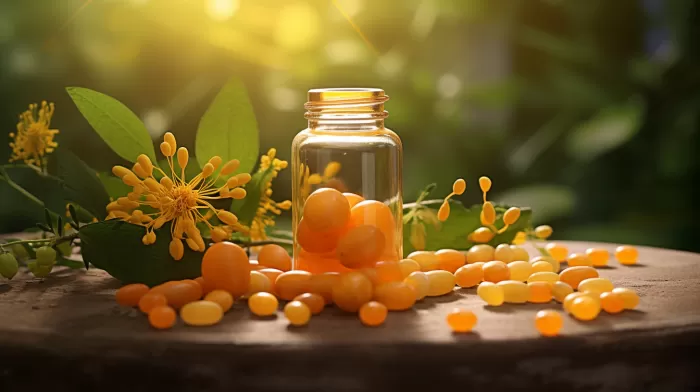As men age, they are more likely to experience chronic age-related disorders, one of which can significantly affect their daily lives is prostatitis. Prostatitis affects 50 percent of men over 50 and can be debilitating to a man’s sexual health and lifestyle. The condition either occurs from infected bacteria (bacterial prostatitis) or as the most common form, known as Chronic Pelvic Pain Syndrome (CPPS), where a man suffers from long-term or acute pelvic pain.
Two natural substances that can help support and restore prostate health, particularly in cases of prostatitis, are pollen and quercetin. Both substances can be consumed individually to aid prostate health, but they work best together in prostate supplements designed to promote better prostate health. They come from plant sources and are considered types of phytotherapy, which is widely used and recommended in cases of prostatitis or CPPS. In fact, the UPOINT system of classification and diagnosis for prostatitis recommends urologists use phytotherapy in cases of prostatitis involving chronic long-term pelvic pain.
What Is Phytotherapy?
Phytotherapy uses herbs or other plant-based products to prevent or treat a health condition. It is popular among men with prostate problems, especially when conventional therapies are not effective, such as taking antibiotics for chronic prostatitis.
Because pollen and quercetin work in slightly different ways, they make the right team to cover overall prostate health, from BPH to prostatitis to prostate cancer. Combining phytotherapies such as pollen extracts and quercetin provides unique mechanisms of action, minimal side effects, low costs, a high level of acceptance by patients, and effectiveness in treating symptoms of BPH and prostatitis.
How do these plant-based therapies work well in combination?
Pollen is an anti-inflammatory, which helps relieve symptoms of BPH and prostatitis. Quercetin is a bioflavonoid phytonutrient also providing anti-inflammatory properties and commonly found in foods such as apples, tea, onions, red grapes, wine, leafy greens, and some berries. Additionally, quercetin has antioxidant and antitumor properties for preventing and fighting prostate cancer.
Quercetin for Prostate Cancer and Prostatitis
Numerous clinical studies have shown quercetin is beneficial for BPH and cases of prostatitis. It has demonstrated the ability to interrupt the spread of prostate cancer and promote cell death. A study published in Molecular and Cellular Biochemistry reported that quercetin could decrease the activity of specific enzymes known to be involved in-tumor invasion and metastases. This finding led the authors to note that quercetin could be developed as a chemo-preventive agent for metastatic prostate cancer.
In a study from the Cleveland Clinic, quercetin was found to be the most effective treatment for prostatitis compared with other treatments. Another trial revealed that 500mg of quercetin taken twice a day for one month resulted in a significant decline in prostatitis symptoms compared to a placebo.
Pollen for BPH and Prostatitis
Most of the studies on pollen and how it affects prostate health have examined Graminex pollen extract, also called Cernilton. Graminex contains pollen from rye, corn, and timothy. Bee pollen extracts have been used for more than 35 years in Europe to help treat BPH. There are several studies on pollen’s effectiveness at relieving prostate symptoms.
Pollen extract is about 70 percent effective at decreasing symptoms of an enlarged prostate such as the need to urinate at night, frequent urination, poor urinary flow rates, and poor urinary volume. Four studies analyzed 444 men with enlarged prostate and found that bee pollen helped improve the need to urinate overnight compared to a placebo.
A study in Japan evaluated 79 patients who took bee pollen for over 12 weeks. When the study ended, the men had increased flow rates, while the residual volume decreased a significant amount. Other improvements were reported for urgency, dysuria, nocturia, delayed voiding, dribbling after urination, and incomplete emptying.
Where Can I Find Quercetin and Pollen?
Both quercetin and pollen extract offer benefits for the support and promotion of prostate health. A prostate health supplement like Prost-P10x is a great way to get the benefits of these two ingredients if you are struggling with prostate health concerns, particularly with chronic disorders like prostatitis and CPPS. Prost-P10x can be used in conjunction with PR Labs Men’s Probiotic, which provides an added layer of support and health recovery for men with prostatitis or CPPS. Probiotics help restore healthy bacteria that can be destroyed by antibiotics used to treat prostatitis.
However, there are a few precautions to be aware of. Bee pollen is not for those who are allergic to pollen, as it could cause a severe reaction with symptoms such as hives, shortness of breath, and swelling of the tongue, face, and throat. Consult your doctor before taking bee pollen if you are allergic to grass, flowers, or other plants. For quercetin, do not exceed 1 gram daily (1000 mg) without consulting your healthcare provider. Most studies showed it is effective at 500mg, the amount found in Prost-P10x.



